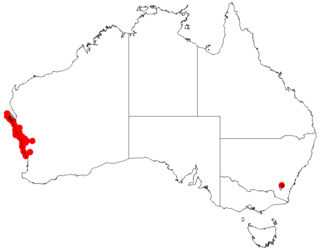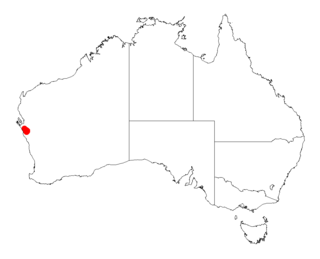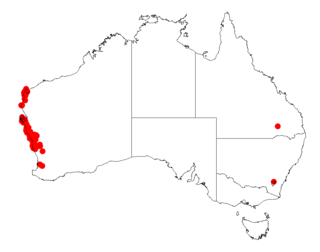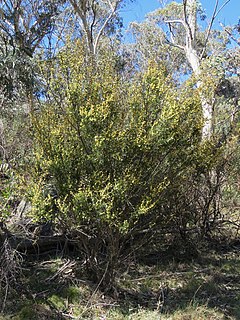Acacia paula is a shrub belonging to the genus Acacia and the subgenus Juliflorae that is endemic to a small area of north western Australia.

Acacia dempsteri is a shrub belonging to the genus Acacia and the subgenus Phyllodineae endemic to south western Australia.

Acacia dentifera, commonly known as tooth-bearing acacia, is a shrub belonging to the genus Acacia and the subgenus Phyllodineae that is endemic to south western Australia.

Acacia heterochroa is a shrub belonging to the genus Acacia and the subgenus Phyllodineae that is endemic to south western Australia.

Acacia hystrix is a shrub belonging to the genus Acacia and the subgenus Phyllodineae that is endemic to south western Australia.

Acacia idiomorpha is a shrub belonging to the genus Acacia and the subgenus Phyllodineae that is endemic to a small area of western Australia.

Acacia lanceolata is a shrub belonging to the genus Acacia and the subgenus Phyllodineae and is endemic to a small area of western Australia.

Acacia pachyphylla is a shrub belonging to the genus Acacia and the subgenus Phyllodineae that is endemic to south western Australia.

Acacia plautella is a shrub belonging to the genus Acacia and the subgenus Phyllodineae that is endemic to a small area along the coast of western Australia.

Acacia profusa is a shrub of the genus Acacia and the subgenus Phyllodineae that is endemic to south western Australia.

Acacia pycnocephala is a shrub of the genus Acacia and the subgenus Phyllodineae that is endemic to south western Australia.

Acacia retrorsa is a shrub of the genus Acacia and the subgenus Phyllodineae that is endemic to western Australia

Acacia scalena is a shrub of the genus Acacia and the subgenus Phyllodineae that is endemic to a small area in western Australia.

Acacia simulans is a shrub of the genus Acacia and the subgenus Phyllodineae that is endemic to south western Australia.

Acacia spathulifolia commonly known as Gold carpet or the Gold carpet wattle is a shrub of the genus Acacia and the subgenus Phyllodineae that is endemic to coastal parts of western Australia.

Acacia sphenophylla is a shrub of the genus Acacia and the subgenus Phyllodineae that is endemic to a small area in western Australia.

Acacia splendens is a tree or shrub of the genus Acacia and the subgenus Phyllodineae that is endemic to a small area of western Australia.

Acacia undosa is a shrub of the genus Acacia and the subgenus Plurinerves that is endemic to an area of south western Australia.

Acacia juncifolia, commonly known as rush-leaf wattle, is a shrub or tree belonging to the genus Acacia and the subgenus Phyllodineae that is endemic to north eastern Australia.

Acacia siculiformis, commonly known as dagger wattle, is a shrub belonging to the genus Acacia and the subgenus Phyllodineae native to south eastern Australia.




















